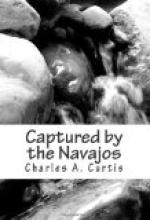There was no grass in the vicinity, and no grain on the train. The animals when turned loose went to the pool and drank, and then wandered about the wagons calling for forage. Lowing of cattle, bleating of sheep, braying of mules, and whinnying of horses never ceased as the suffering animals wandered in search of food. There was no fuel for fires in the midst of this petrified forest of prostrate trees, so hard bread and raw bacon made our supper.
After a time I began to wonder why Vic had not come to greet me. She had accompanied Henry when he went back with my message, and I knew that if he had returned she would have looked me up immediately. I was about to search for her, when Frank appeared, and asked, “Have you seen my brother?”
“No,” I replied, “nor have I seen Vic. They must be with the rear guard.”
“No, sir; they are not there. I have just seen the sergeant of the guard.”
“Have you visited the Arnolds?”
“Yes, sir; and Miss Brenda says they have not seen him since he came back from you.”
“Is not Corporal Henry here?” asked Captain Bayard, who had approached and overheard a part of our conversation.
“No, sir,” I answered. “I sent him to you at Carizo to say we had found no water.”
“He reported to me,” the captain replied, “and I sent him back at once with orders for you to proceed to Lithodendron, as you have done.”
“He did not reach me. I came here because it seemed the only thing to do.”
“Henry not here!” and the captain and all of us began moving towards the train. “Cause an immediate search to be made for him. Examine every wagon. He may have got into a wagon and fallen asleep.”
It is needless to say, perhaps, that this search was participated in by nearly every individual in the command not too tired to stir. Henry was known to all, and had in many gentlemanly and kindly ways acquired the respect and affection of soldiers and civilian employes.
Every wagon was examined, although from the first there was a general presentiment that it would be useless. In the wagon assigned to the use of the boy corporals and myself, Henry’s carbine and revolver were found, but Frank said his brother had not worn them during the day.
The mule and cavalry herds were examined for the cream-colored pony, but that also was missing. Then the thought suggested itself that the lad might be wandering on the road we had just traversed; but an examination of the sergeant of the guard showed that to be impossible.
But one conclusion could be arrived at, and that was that Henry had been picked up by the Navajos when returning from the command to my detachment on the Carizo.
At the conclusion of the search the officers gathered near their wagons for a consultation. Frank remained apart, silent and miserable.
Captain Bayard said: “It is impossible for us to make an immediate pursuit with horses in such a condition as ours. To attempt a pursuit over the barren region about us would be to invite failure and disaster. If we had Mexican ponies, or Indian ponies like those of the boys, we might start at once. The boy is probably a prisoner, and a delay of one or two days can make little difference to him.”




